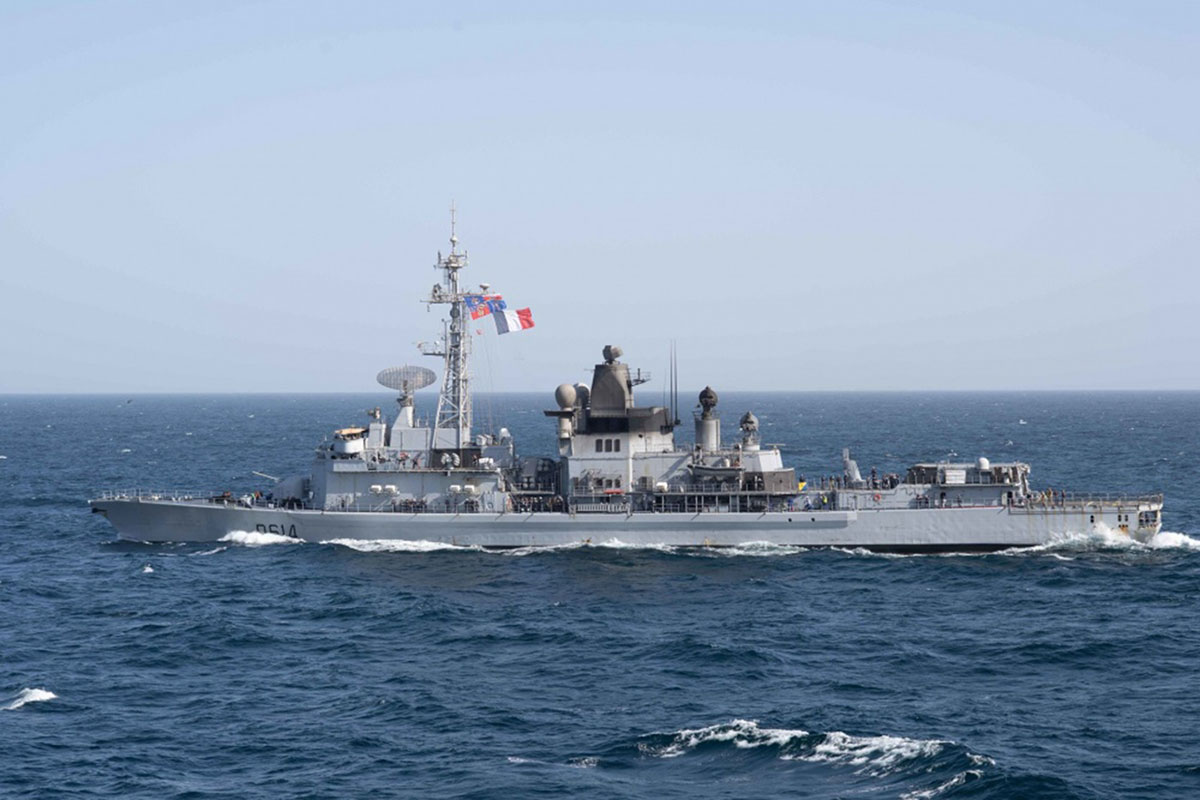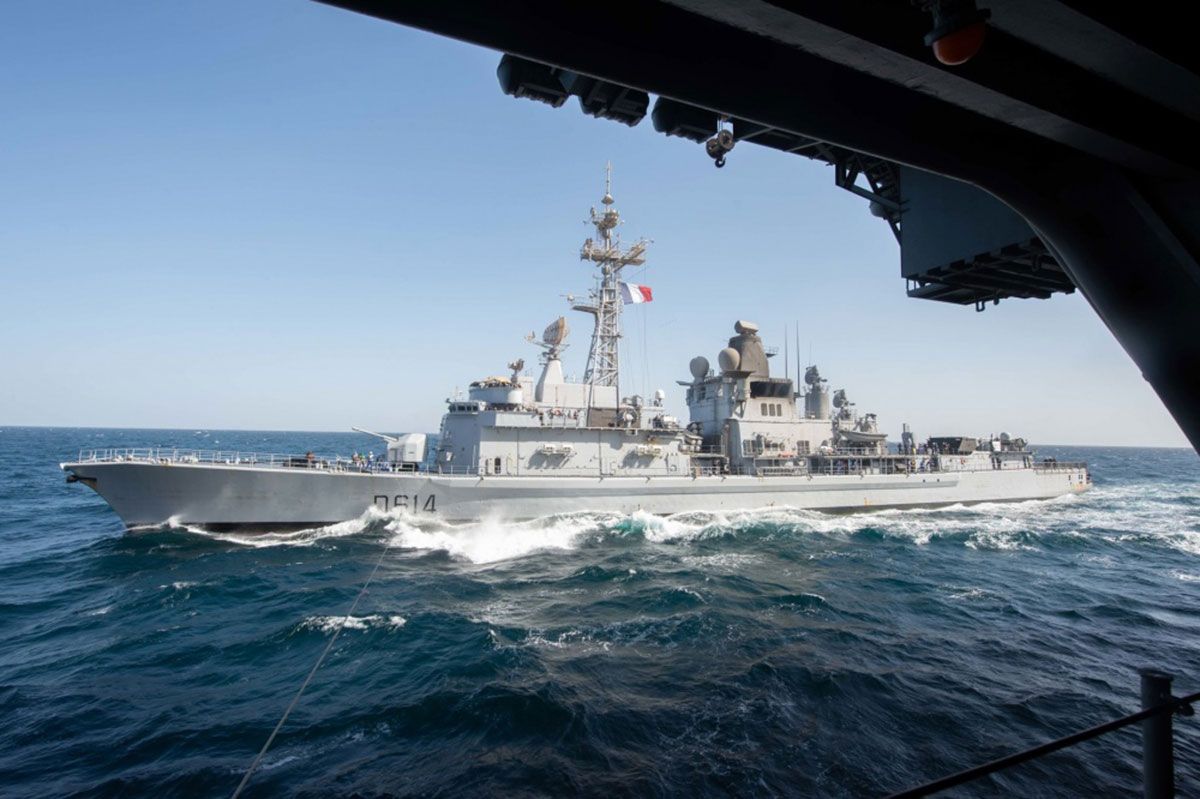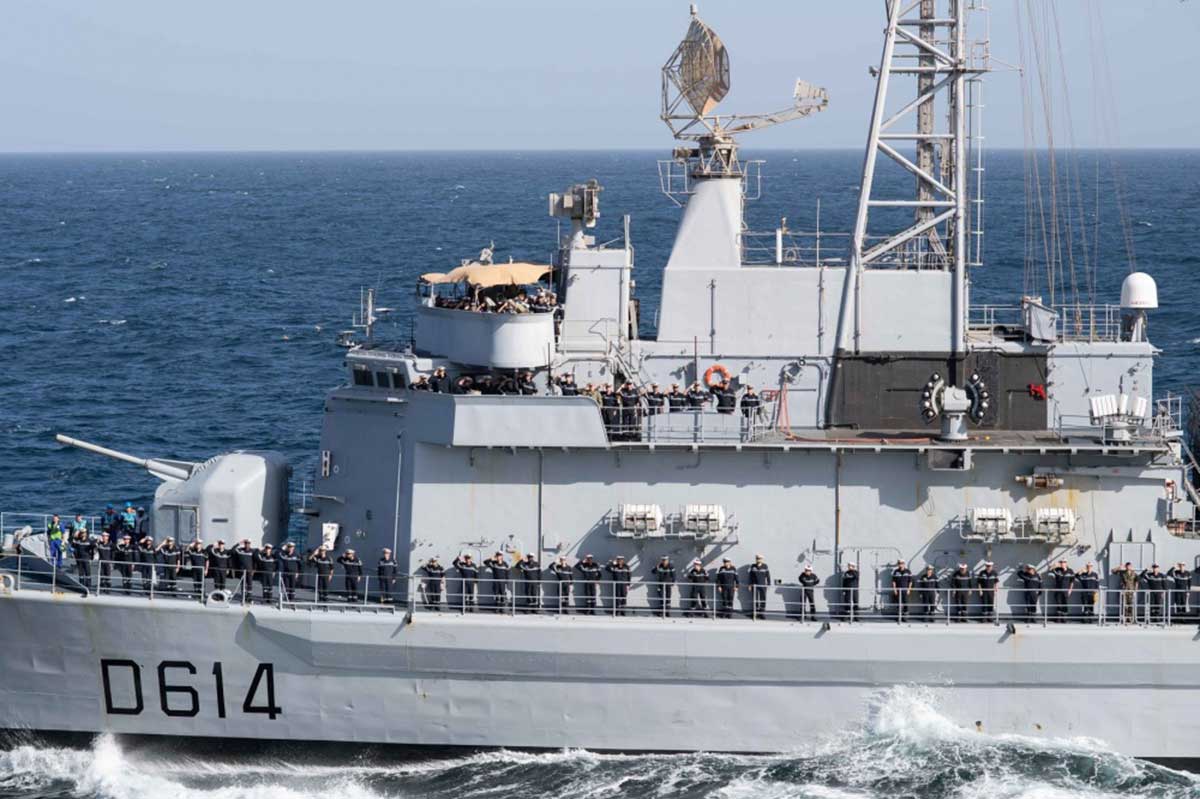The aircraft carrier USS John C. Stennis (CVN 74) and France’s Marine Nationale F70AA-class air defense destroyer FS Cassard (D 614) culminated weeks of interoperability training with a fueling-at-sea (FAS)…
Arabian Gulf ─ (NNS) ─ The open ocean is a vast and sometimes unpredictable area in which the world’s navies operate. Maritime forces must often rely on helping hands from allies to complete missions.
The aircraft carrier USS John C. Stennis (CVN 74) and France’s Marine Nationale F70AA-class air defense destroyer FS Cassard (D 614) culminated weeks of interoperability training with a fueling-at-sea (FAS), Jan. 21.
“The Cassard was fully integrated into our strike group as a multi-warfare unit, focused on air defense,” said U.S. Navy Lt. Cmdr. Pia Chapman, USS Mobile Bay’s (CG 53) liaison officer embarked on the John C. Stennis. “[The Cassard] conducted operations as the alternate air and missile defense commander for the John C. Stennis Carrier Strike Group.”
The John C. Stennis Carrier Strike Group serves as Task Force (TF) 50 while operating in U.S. 5th Fleet, and Cassard was fully integrated into the command and control structure during the interoperability training.
Cross deck training, where Sailors from the John C. Stennis and the Cassard were flown to each other’s ships, took place over the course of the interaction.
“More than 20 personnel across all rates and ranks went from ship-to-ship to see and learn how their allied counterparts operated,” said Chapman.
Cassard also participated in exercise Intrepid Sentinel while operating with TF 50. Maritime forces from France, the United Kingdom, Australia and the United States participated in the maritime warfare exercise in the Arabian Gulf, Jan. 15-17.
The U.S. Navy operating with its allies is not a new concept.
“Think back to both of the Desert Storm operations,” said U.S. Navy Capt. Murzban Morris, commodore of Destroyer Squadron (DESRON) 21. “It’s never been a U.S.-only event. We can use this opportunity to do an exercise in an area of the world where we might have to operate again. We use joint exercises [like Intrepid Sentinel] to show that we can operate together at a moment’s notice, whether or not it is in a time of crisis.”
Beside personnel cross-training, French Panther helicopter conducted deck landing qualifications on the John C. Stennis’ flight deck.
“Our strong partnership is an essential asset for the maritime security in the Indian Ocean,” said French Maritime Nationale Capt. Mackara Ouk, commanding officer of the Cassard.
Partnerships sometimes include letting allies control some aspects of our strike group in support of the mission at hand.
U.S. Navy Lt. j.g. Beau Denson, the tactical action officer aboard the John C. Stennis said the Cassard was able to direct our carrier strike group’s assets in simulations against unfriendly forces.
“[The Cassard] conducted plane guard duties and provided an artificial horizon to help landing signal officers and pilots in safely recovering aircraft at night,” said Denson.
The Cassard controlled more than nine defensive counter-air events and acted as the officer-in-charge of the exercise of the Intrepid Sentinel Air Defense Exercise (ADEX). ADEX involved elements from the Royal Australian Navy and Electronic Attack Squadron (VAQ) 135, an expeditionary squadron that flies the E/A-18G Growler.
Being able to safely conduct maritime exercises with coalition forces is a testament to the power of allied nations. By conducting joint exercises, the coalition can strengthen existing capabilities of deterring potential adversaries, assuring regional partners in our commitment to maritime security, and operating wherever international law allows.
The John C. Stennis Strike Group is deployed to the U.S. 5th Fleet area of operations in support of naval operations to ensure maritime stability and security in the Central Region, connecting the Mediterranean and the Pacific through the western Indian Ocean and three strategic choke points.
U.S. 5th Fleet area of operations encompasses about 2.5 million square miles of water area and includes the Arabian Gulf, Gulf of Oman, Red Sea, and parts of the Indian Ocean. The expanse is comprised of 20 countries and includes three critical choke points at the Strait of Hormuz, the Suez Canal, and the Strait of Bab al-Mandeb at the southern tip of Yemen.
For more news on John C. Stennis, visit www.stennis.navy.mil or follow along on Facebook at www.facebook.com/stennis74.
Get more information about the Navy from US Navy facebook or twitter.
For more news from USS John C. Stennis (CVN 74), visit www.navy.mil/local/cvn74/.













